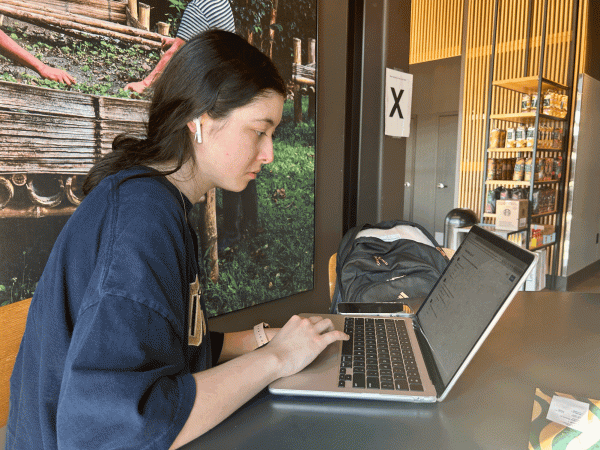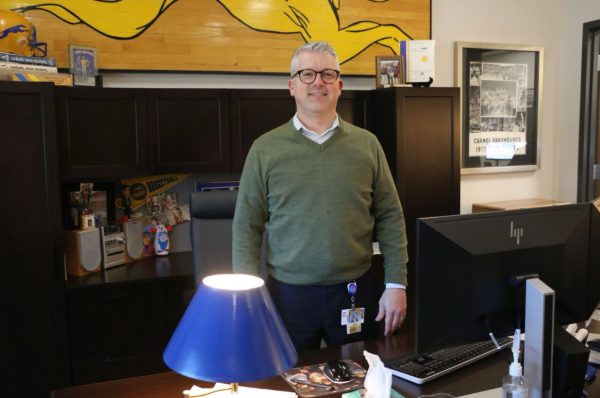Carmel students address climate change; think globally, act locally
According to The National Climate Change Assessment, “Over the last 50 years, much of the United States. has seen increases in prolonged periods of excessively elevated temperatures, heavy downpours, and in some regions, severe floods and droughts.” With the increase of severity and occurrences of major storms, forest fires, droughts, and floods experts have warned that the time to make a change is now, before irreversible damage is done. This past October, the United Nations issued a report on climate change. This was a wakeup call on how the environment has been affected by humans. The report stated there are approximately twelve years to make changes to halt climate change before we see environmental disasters take place that will be almost impossible to stop. Here at CHS, the Environmental Action Club is a group of students that are passionate about educating people on the changes they can make to help the environment.
“It’s not a hoax, it’s real. Climate change is real and it’s happening. We need to face up to it,” said Sarah Gillim, sponsor of Environmental Action club.
Gillim thinks that the main issue right now is that it seems like most people ignore the problem.
“I think it’s a big issue that we’re not really addressing. The big things are going to have to be done by our leaders, but for everyday people, try to switch out all of your lights to LED, make your home as energy efficient as possible, walk or ride your bike places if possible, I know at this time of year you can’t do that because it’s so cold, but try to not use the car if you don’t have to. If you’re flying somewhere, see if you can do some kind of carbon offset. See if you can plant trees somewhere,” Gillim said.
Students at CHS are trying to make modifications to their everyday routines that will reduce waste and help the environment.
“I try to carpool with my friends to places and I stay away from single-use plastic. I think everyone should do this because little changes can make a big difference and it’s not that hard to help the environment,” junior Layla Qureshi said.
According to research conducted by the National Aeronautics and Space Administration (NASA), the Earth’s average temperature has increased approximately 2 degrees over the course of the 20th century. Historically, the Earth’s temperature has remained constant over long periods of time. NASA scientists concluded that while an increase of two degrees may not seem substantial, slight changes in temperature correlate with major shifts in in our climate. A main reason for this increase is because carbon dioxide levels are at the highest they’ve been in 650,000 years. This is partly due to fossil fuels.
“Recently, the Environmental Protection Agency (EPA) has been a lot less restrictive on pollution and regulations regarding pollution. I think that’s definitely not good for our country. I feel like it’s hard to look forward and make these improvements when organizations aren’t creating better standards for us to follow,” said Ben Ring, junior and co-president of Environmental Action club.
Globally, countries have come together to try and help the solve climate change issue. One such attempt is The Paris Climate Agreement, which currently has 195 countries committed to reduce greenhouse emissions. In 2017, President Donald Trump withdrew the United States from the agreement.
“I think it’s shameful because even North Korea’s on the list and even if we do continue to follow some of these goals we set for ourselves, I think it’s disappointing to see us fall out of that while almost every country in the world is a part of it,” Ring said.
In 2015 the United States, under the Obama administration, came up with the Clean Power Plan to reduce carbon dioxide emitted from power generation.
“The current administration is trying to get rid of the Clean Power Plan. The Clean Power Plan is to try to help us move away from fossil fuels toward renewables, but the current administration is trying to nix that and support fossil fuel industries instead. We have to move completely away from fossil fuels. Even though people say natural gas is going to be less carbon producing, the whole process of fracking is very intensive and releases greenhouse gases so that’s not the solution,” Gillim said.
Carmel is trying locally to be environmentally friendly. The city has installed more than 100 round-a-bouts which reduces the time vehicles spend idling. Multi-use paths have been installed throughout the city which enables people to use bikes or walk to get around instead of relying on vehicles. Both investments reduce carbon emissions.
“I like how Carmel is investing in the environment. By installing the bike paths it’s easier for me to be able to ride my bike places and the roundabouts help traffic move quicker than stop lights. I appreciate how these changes just make it more convenient for everyone to be environmentally friendly,” junior Julia Sweet said.
Ring thinks the best thing Carmel residents can do is make a change in their lifestyle, even if it’s not huge. “The easiest thing to say would be that (climate change) is real and it’s a huge problem. I think that as the population grows it’s good to think about ways we can be better for the environment. People should be thinking about what they’re doing”.
Your donation will support the student journalists of Carmel High School - IN. Your contribution will allow us to purchase equipment and cover our annual website hosting costs.































![British royalty are American celebrities [opinion]](https://hilite.org/wp-content/uploads/2024/03/Screenshot-2024-03-24-1.44.57-PM.png)




















![Review: Quiet on Set: The Dark Side of Kids TV is the long awaited exposé of pedophilia within the children’s entertainment industry [MUSE]](https://hilite.org/wp-content/uploads/2024/04/unnamed.jpg)
![Review: “The Iron Claw” cannot get enough praise [MUSE]](https://hilite.org/wp-content/uploads/2024/04/unnamed.png)
![Review: “The Bear” sets an unbelievably high bar for future comedy shows [MUSE]](https://hilite.org/wp-content/uploads/2024/03/unnamed.png)
![Review: “Mysterious Lotus Casebook” is an amazing historical Chinese drama [MUSE]](https://hilite.org/wp-content/uploads/2024/03/0.webp)
![Thea Bendaly on her Instagram-run crochet shop [Biz Buzz]](https://hilite.org/wp-content/uploads/2024/03/IMG_0165-1200x838.jpg)
![Review in Print: Maripaz Villar brings a delightfully unique style to the world of WEBTOON [MUSE]](https://hilite.org/wp-content/uploads/2023/12/maripazcover-1200x960.jpg)
![Review: “The Sword of Kaigen” is a masterpiece [MUSE]](https://hilite.org/wp-content/uploads/2023/11/Screenshot-2023-11-26-201051.png)
![Review: Gateron Oil Kings, great linear switches, okay price [MUSE]](https://hilite.org/wp-content/uploads/2023/11/Screenshot-2023-11-26-200553.png)
![Review: “A Haunting in Venice” is a significant improvement from other Agatha Christie adaptations [MUSE]](https://hilite.org/wp-content/uploads/2023/11/e7ee2938a6d422669771bce6d8088521.jpg)
![Review: A Thanksgiving story from elementary school, still just as interesting [MUSE]](https://hilite.org/wp-content/uploads/2023/11/Screenshot-2023-11-26-195514-987x1200.png)
![Review: When I Fly Towards You, cute, uplifting youth drama [MUSE]](https://hilite.org/wp-content/uploads/2023/09/When-I-Fly-Towards-You-Chinese-drama.png)
![Postcards from Muse: Hawaii Travel Diary [MUSE]](https://hilite.org/wp-content/uploads/2023/09/My-project-1-1200x1200.jpg)
![Review: Ladybug & Cat Noir: The Movie, departure from original show [MUSE]](https://hilite.org/wp-content/uploads/2023/09/Ladybug__Cat_Noir_-_The_Movie_poster.jpg)
![Review in Print: Hidden Love is the cute, uplifting drama everyone needs [MUSE]](https://hilite.org/wp-content/uploads/2023/09/hiddenlovecover-e1693597208225-1030x1200.png)
![Review in Print: Heartstopper is the heartwarming queer romance we all need [MUSE]](https://hilite.org/wp-content/uploads/2023/08/museheartstoppercover-1200x654.png)




























![Joseph Broman, Mu Alpha Theta sponsor, grades tests for his honors precalculus/trigonometry class. Broman said, “I’m retiring from the Math Club next year and I’m just going to do Mu Alpha Theta so I can focus on that one and we can do more [speaker series] first semester.”](https://hilite.org/wp-content/uploads/2024/03/IMG_9502-600x450.jpg)